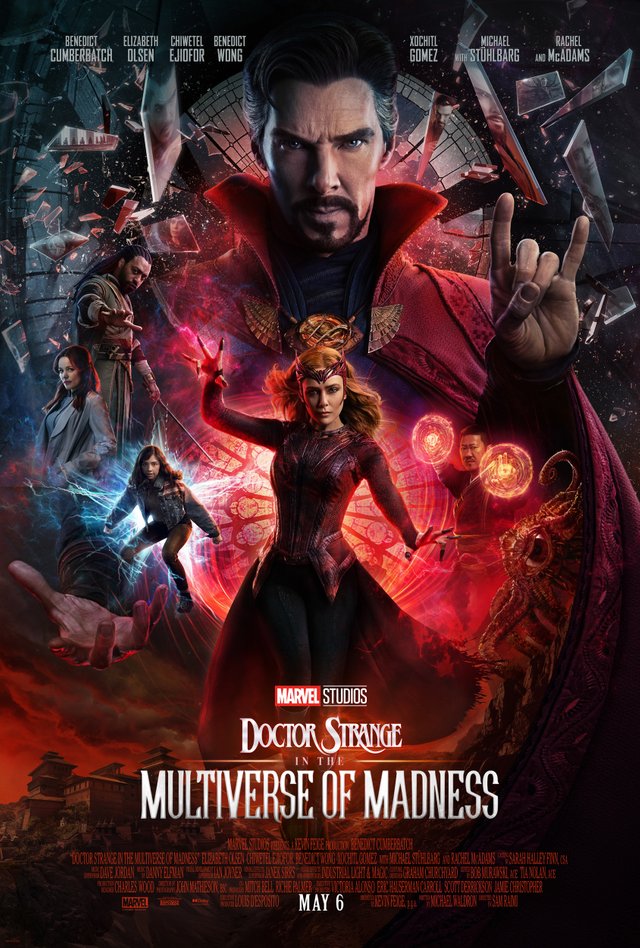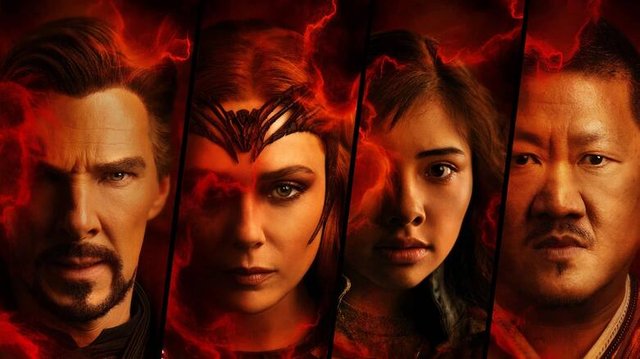Well, here's still another movie that doesn't need my help to be successful. In fact, the most helpful thing I could do is warn casual moviegoers: "Doctor Strange in the Multiverse of Madness" is not what you might think.
The movie opens with Doctor Strange, a magician played with the usual skill by Benedict Cumberbatch, trying to protect a teenage girl from an attacking monster.
It kills him.
Next we find Doctor Strange trying to protect a teenage girl from an attacking monster. This time he succeeds; it's the same girl, but a different Strange.
Things get more Strange from here. The good Doctor's attempt to save the universe--well, all the universes--takes him from one dimension to another, fleeing an unexpected enemy far more powerful than he is. Along the way we get some old favorites (was the first Doctor Strange really six years ago?), and cool cameo appearances.

But you have to understand this: Marvel movies have been fantasies, comedies, action-adventure, and science fiction, but this one is a flat out horror movie.
Consider that before you take your kids. This isn't just comic book violence, and the people who die aren't just background characters. It gets graphic, and it gets, well, horrible. It's also a great addition to the Marvel Cinematic Universe and a good movie in general, so don't let the genre stop you; just be aware.
My Score:
Entertainment Value: 5 out of 5 M&Ms. By now you've figured out that I don't go to the movies unless I'm already pretty sure I'll like the flick. As with many Marvel movies, I marvel (see what I did, there?) at how they manage to put together a tale like this in a way that can be followed by the average viewer.
Oscar Potential: 4 out of 5 M&Ms. Naturally it's visually great, and has amazing performances, especially by Cumberbatch and Elizabeth Olsen. I'd love to see all these characters again--including the dead ones, which in a multiverse is always possible.

http://markrhunter.com/
https://www.amazon.com/-/e/B0058CL6OO
https://www.barnesandnoble.com/s/"Mark R Hunter"
I think the person, who came up with the idea of the multiverse, should get an Oscar. For doing all the screen writers such a tremendous favour. But as there is no such category (at least I don't think so, but one can never be sure with the Oscars), perhaps for a life achievement.
But hang on... may be the multiverse is real. At least some scientists think so. Well what ever, its still a achievement. :)
Downvoting a post can decrease pending rewards and make it less visible. Common reasons:
Submit
I sure hope all my dreams aren't real in some other universe!
As far as I know, the first use of a multiverse in pop entertainment was DC's Flash comic, where they had the then-modern Flash meet the Golden Age flash of decades before. Everything went crazy from there!
Downvoting a post can decrease pending rewards and make it less visible. Common reasons:
Submit
I'm not sure when I heard of it the first time. I'm certain to have seen it in STNG, when the Enterprise meets its evil twin in a alternate timeline. So that would make it 80s, I guess.
Often such things are getting picked up by writers if they have started to emerge in the science community. Often only as a wild theory which is laughed about. Until later, when they find that there might be more to it than they thought...
This can be found quite a lot in early SF, from the 50s and 60s. Or even in the very early stuff, like the novels by Jules Verne, with the giant submarine or the journey to the moon. Such ideas did not come out of the blue, there were people who talked about it at the time. But generally they were concidered to be nonsense. And our emperor Wilhelm II said "The automobile will never be able to replace the horse." :)
Downvoting a post can decrease pending rewards and make it less visible. Common reasons:
Submit
Oh, the evil Mirror Universe in Star Trek dates back to the late 60s! One of their better stories back then, too, so much that it's been revisited several times. I suppose DC Comics beat them mostly because they had two different and distinct Flash characters, which made them think about ways to get them together.
I just went back and checked--that Flash story dated back to 1961!
Downvoting a post can decrease pending rewards and make it less visible. Common reasons:
Submit
In was in the original series already? I don't remember that. May be its time to watch it again, got it all in DVD. Btw., did you also see Shatner going to space recently? There is a little TV docu about it. Man, that really touched him. He was always a bit of a big mouth, but not after that trip anymore. He actually cried on camera. I mean, it is a really weird way life went for him - for nearly 60 years he was "Cpt. Kirk", the archetype of the space traveller, and now at the age of 90 he goes to space for real. Even if it only was for 10 minutes or so.
And the Flash comic from 1961 would put the idea even before Star Trek, astonishing. I also do not recall having read about it in the Perry Rhodan series (the German SF booklet series), that started about the same time. And they had just about everything in their stories that you see in ST or any other SF movie or series. May be in later years they also had it, I didn't read all 4000 booklets, only the first 800 or so.
Downvoting a post can decrease pending rewards and make it less visible. Common reasons:
Submit
Yeah, the episode was called "Mirror, Mirror" ... alternate Spock had a goatee! I did see Shatner's trip; he clearly was greatly moved. I would have been too, even if I hadn't played a starship captain.
I've heard of the Perry Rhodan series, but I've never actually seen one--I wonder if they've been translated to English? But you're right, just about everything on TV and movies today came first in SF writing--I devoured a lot of 50s and 60s SF when I was a kid. My junior English teacher was the daughter of E.E. "Doc" Smith, who was hugely popular, and was probably the king of space opera. He started publishing in the 1920s! Then there was L. Frank Baum, who created probably the first fictional robot in the second Oz book, "The Land of Oz". That came out in 1904.
Downvoting a post can decrease pending rewards and make it less visible. Common reasons:
Submit
I think I have mentioned Perry Rhodan some time ago. Its the biggest SF series ever, starting in 1961 and has sold 2 billion copies by now. It was briefly translated and published in the US during the late 60s or 70s, but it was not as successful there. Too much competition perhaps, or may be it was not a medium the Americans were used to. Its kind of a booklet, a bit smaller than a A4 paper, with 66 pages, and it was only 50 cent or so. They were sold at paper stands, not book stores. There were a number of other booklets (we say Hefte) in several genres, like Western stories, Crime, Love, Horror and even WW2 stories. But Perry Rhodan was the only SF series I kwnow of. Though, it soon got a spin off, called Atlan, who was Perry Rhodan's alien buddy, so the stories kind of overlap. If you want a bit more info have a look here: https://en.wikipedia.org/wiki/Perry_Rhodan
Of course there were books that may or may not be SF, also before Jules Verne. Its always a matter of interpretation what SF is supposed to look like. Especially on the science part things get a bit hazy if you look back in time. The oldest SF story I read was from ancient Greece - it was a proper Space Opera with thousands of flying chariots and creatures at war in the sky, really weird stuff. But there was no concept of spaceships as we understand it, it was more like gods and demons and such. So more what we would call Fantasy today.
Similar goes for the Oz story. Is the tin man a robot? Is Oz a alternate reality? One could say so, although its never been called that in the book. Or the famous Frankenstein story - thats actually a SF.
E.E. Smith doesn't ring a bell either, but may be I have read something some time ago. I have read some old SF books at one point, like Stanislav Lem and other, but thats long ago.
Downvoting a post can decrease pending rewards and make it less visible. Common reasons:
Submit
Sometimes things don't translate well from one county/language to another, so that might be part of it. After all, a lot of Americans still don't get American SF, let alone that from other countries. The shorter format might have been a turn-off for many readers, too, although now novellas are becoming more popular as e-books.
I could go on about the Oz books for ages, but in the end they're straight up fantasy, despite having the occasional SF element. Tik-Tok was a robot, no doubt about it, but he had to be wound up, like a music box, to work. The Tin Woodman, on the other hand, was a regular person whose body parts were chopped off, one after another, after the Wicked Witch enchanted his ax. They were replaced to a local tinsmith--you won't see that it most modern versions! Baum treats Oz like a real place, and hints dropped here and there would suggest it's somewhere in the South Pacific. In my (so far unpublished) novel Oz was indeed there, but was transported along with other magical lands to its own dimension. Increased incursions by the outside world caused the change, as planes and ships gained greater range.
Downvoting a post can decrease pending rewards and make it less visible. Common reasons:
Submit